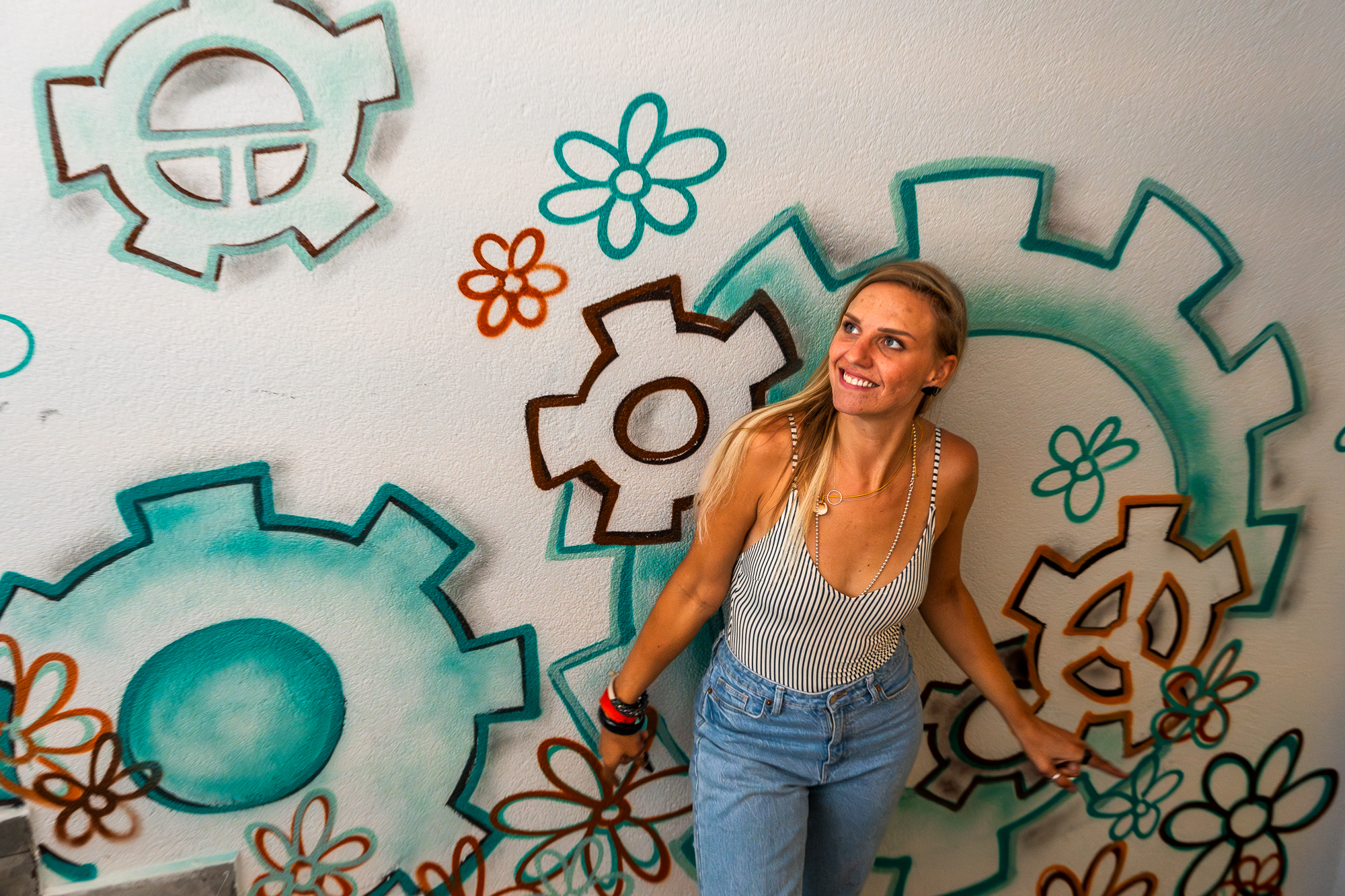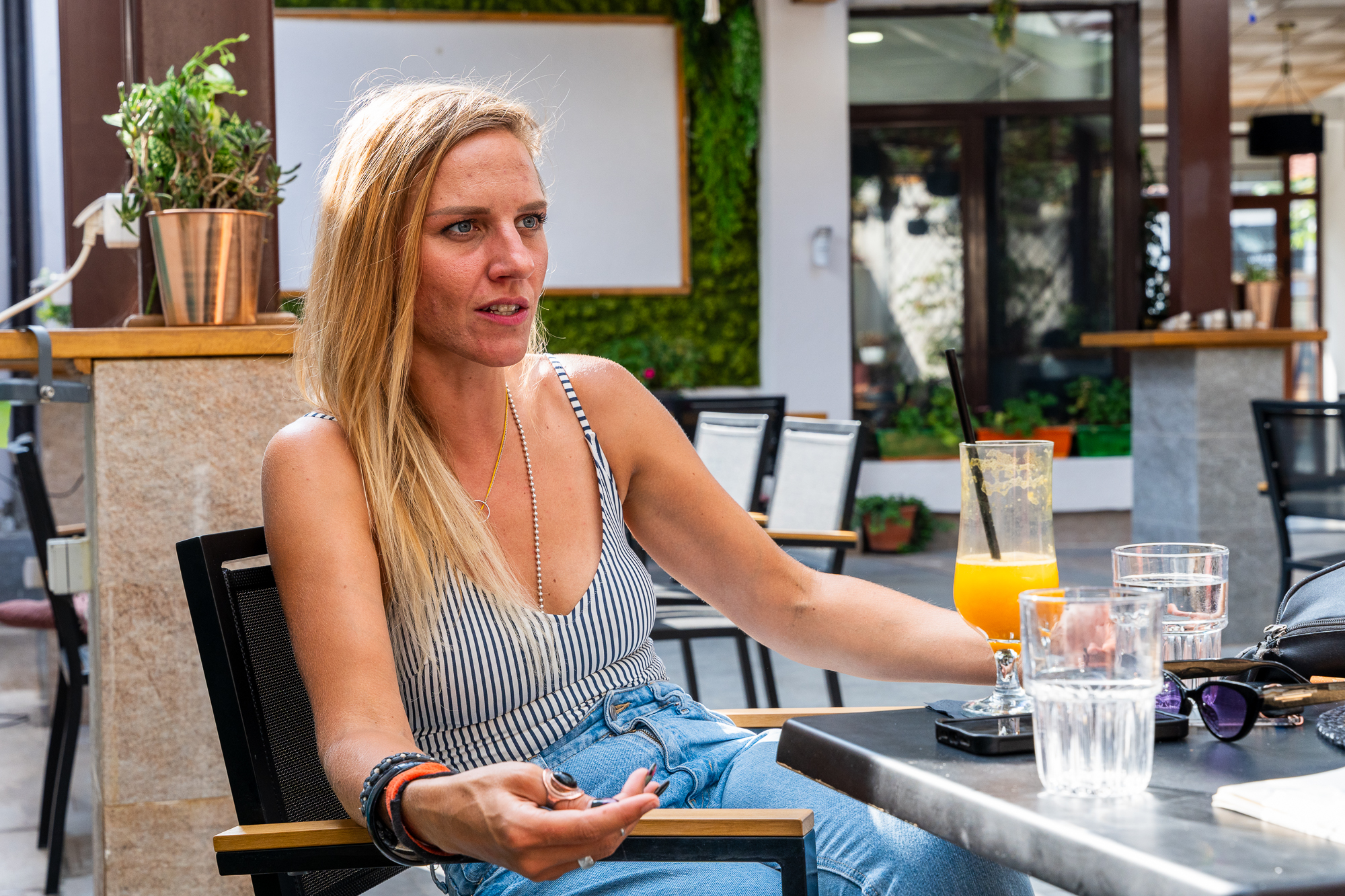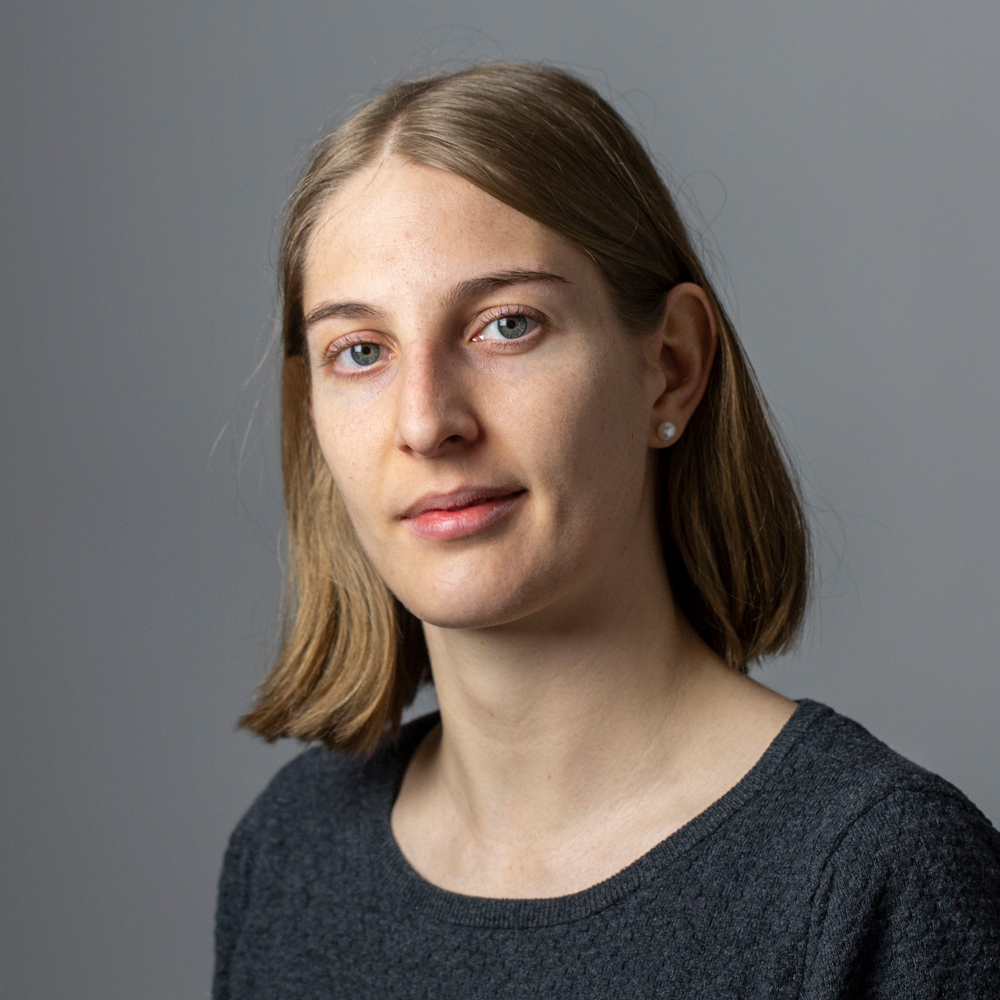Swiss graffiti star finds home and renewal in Kosovo

Graffiti artist Krystel (Krissy) Suire first set foot in Kosovo five years ago to attend a street art festival. “It was 8.30am, the airport was empty, and I asked myself what am I doing here with a unicorn hat on my head?” recalls the native of western Switzerland, also known by the pseudonym Stern (Star).
She had expected a conservative Muslim country – scarred and gloomy after the 1998-99 Kosovo War that still casts a shadow on regional politics today. But as soon as she entered the arrivals hall of Pristina International Airport, these preconceived notions melted away. “Oh Stern, you are here!” a warm loud voice beckoned.
“The festival organiser opened his arms wide and literally shouted, ‘Welcome to Kosovo!’” she recalls with tears of joy. “He took me in his arms and immediately I felt at home.”
Open-minded people, lively nightlife.
At the Street Art & Graffiti Festival Krystel Suire, who prefers to be called Krissy, felt stupid wearing her long-sleeved shirts and pants in the summer heat. “I didn’t want to hurt anyone’s feelings and thought in a Muslim country this was appropriate attire,” she says. “But as the hip hop music pounded out of the speakers, I was surrounded by many women in shorts and crop tops.”
Instead of an oppressive, conservative society, Krissy found open people and a lively nightlife in Pristina.
There were a few trouble spots in her life in Switzerland at the time, which is why the thought of emigrating had already crossed her mind once – but to Kosovo?
To get a feel for the place, she returned to Kosovo for a month soon after that first visit in 2018. On the final night of that test month, she met a man who would become her future flatmate. He agreed to hold a room for her for three days after her return to Switzerland so she could think about it. But already on the way from Geneva airport to her hometown Yverdon-les-Bains, her mind was made. She let him know her decision: she was moving in.
“My move to Kosovo was like a second birth,” Krissy says. “I became a new person and made peace with myself.” It is here that Stern made a name for herself as a graffiti artist.

Today she continues to thrive and is an integral part of the rave scene in Kosovo and neighbouring Albania.
Art ‘Made by Stern’
Krissy’s graffiti art is highly recognisable. Her iconic characters and colorful murals can be seen in almost every city of Kosovo. Among other projects, she was asked to paint the Pristina Observatory, a scientific and educational astronomy hub that opened its doors the summer of 2022.
SWI swissinfo.ch met up with Krissy at the feet of one of her biggest pieces of work, a 12-metre wall painting in the co-working space Lavjerr’S. Lavjerr means pendulum in Albanian, the pendulum of the clock. This is why the artist has wrapped the room in surrealistic clocks. There is no connection to Swiss watchmaking tradition. In fact, the artist finds life in Kosovo much less scheduled compared to her native Switzerland.
“In Switzerland I always knew my schedule six months in advance,” explains Krissy. “Now it’s every three weeks”.
She worked on the wall in Lavjerr for four days. “About six hours a day – but six intensive hours,” says the artist. While spraying, she ate nothing, drank nothing, and spoke with nobody. That, she says, is the level of concentration needed for her to work successfully.
But even her intense level of focus could not keep Kosovan hospitality at bay. Her clients kept coming with lemonade, baklava, and lunch. “I appreciate it very much and it makes me happy, but it breaks my concentration,” she says.
Her signature “Made by Stern” figures are cuddly, with soft facial features and oversized eyes. “Inside I’m rather chummy, but my art is more maternal, calm and soft,” she says. “Whoever sees my art should feel inner peace in the process.”
Whether her paintings decorate an office or a street wall is not relevant for her. “I see myself as an artist,” she says. “What turns my art into street art is the rain or scratches from cars or somebody writing on it”. Krissy is currently planning performances in which spraying will come together with music. The interaction of sound and colour interests her.
In Kosovo there is generally greater interest in what she does as an artist, how she does it and why she does it. “Instead of asking, ‘Can you make a living from it?’ like in Switzerland, in Kosovo they ask, ‘Oh, can I see something?’” explains the artist.
“In Switzerland, I felt guilty for feeling free,” she adds. “It’s different here.”

A life like a vinyl record
A large network of friends and confidantes ensured Krissy had no problems building her new life in Kosovo. They helped her with everything from signing the rental contract to setting up her own business.
For a long time, she kept an account in Switzerland to make it easy for clients there but, as a resident of Kosovo, she was still eyed with suspicion by Swiss clients.
“Because I live in Kosovo, some people think my work is shady or that I’m in the mafia,” she says. It bothered her enough to drop the Swiss bank account.
“I live in Kosovo,” she says. “My client hires someone who lives in Kosovo so they should adapt to Kosovar rules. Otherwise, they can hire someone in Switzerland. I don’t care about that. I have clients here. I have clients there.”
In Kosovo she paints for NGOs and companies. In Switzerland, “Made by Stern” clients include the city of Geneva, among others.
Clearly there is less bureaucracy in Kosovo than in Switzerland. But it is on the rise here too, she says. Krissy values security, of course, but all the forms and formalities run counter to her anarchic side.
“Life in Kosovo feels analogue, like a vinyl record,” she adds. “Life in Switzerland is like an MP3 file: digital.”
Krissy dislikes the fact that Kosovo is becoming more like Switzerland. “DJ sets are also better when vinyl records are played,” she stresses. “I want my life to remain a vinyl set.”

‘It sucks being a Swiss Abroad’
The graffiti artist has no set idea on where she will live for the rest of her life. But for now, she says she is very happy in Kosovo.
Being a Swiss citizen abroad does have its downsides. “It sucks to be Swiss abroad,” she says. “Of course, the Swiss passport is useful, also when the police stop me. But it also sucks because some people are nice to you only because they want something from you.”
Luckily her Albanian, an official language in Kosovo, is now good enough that most people think she comes from Albania.
“In Albania I am asked if I come from Kosovo,” she says. “In Kosovo they ask me if I come from Albania. Most of the time I just say yes”.
Edited by David Eugster/ds
Translated from German by Sue Brönnimann

In compliance with the JTI standards
More: SWI swissinfo.ch certified by the Journalism Trust Initiative










You can find an overview of ongoing debates with our journalists here . Please join us!
If you want to start a conversation about a topic raised in this article or want to report factual errors, email us at english@swissinfo.ch.